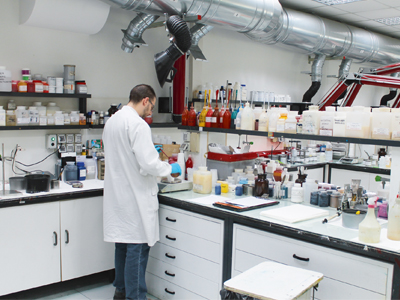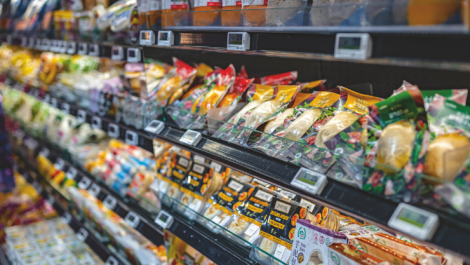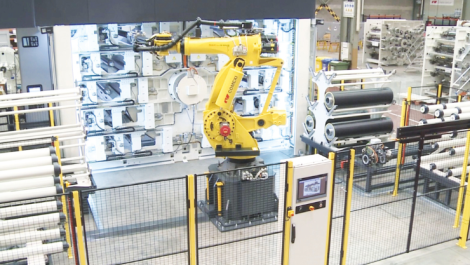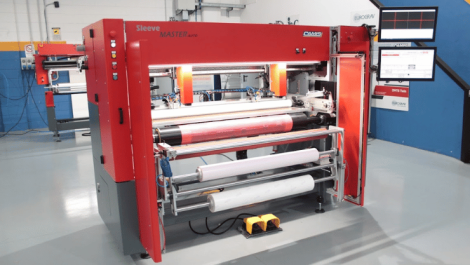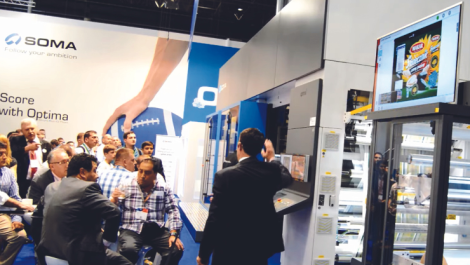There are extensive testing facilities at the Vicenza site
As hubergroup introduces its liquid inks business into the UK, Neel Madsen went to its Italian mother plant in Vicenza to learn about the company’s ethos and find out why the manufacturer has been so successful in growing its business worldwide.
Perhaps one of the best kept secrets in the UK, hubergroup is well known on the Continent where its inks are used for anything from newspapers to packaging printing. Trading previously as Stehlin Hostag, the new rebrand as hubergroup UK coincides with some major investments as the ink manufacturer is set to expand its solvent-based inks for packaging printing into what it sees as a gap in the market.
During 2014, the UK division of the global company has been operating somewhat under the radar, launching its Gecko range into the UK market, already doing trials with several large flexible packaging printers. Managing director David Ward said, ‘We may be a new ink supplier to the UK flexo and gravure markets, but hubergroup is well established in mainland Europe, and we have a global reach with three main production sites and full control of our raw materials within the supply chain. We also have a lot of experience supplying inks to the offset market which we can transfer.’
The family-owned hubergroup comprises 40 companies throughout Europe, North and South America, Asia, Australia and New Zealand. It first started production in 1765 in Germany, and is today the world’s fourth largest printing ink manufacturer, employing over 3500 staff and amassing global sales of €900 million in 2014. In 2005, hubergroup acquired Micro Inks in India, as not only a market leader in the production of printing inks, but also as a raw materials and pigments manufacturer, in a strategic move which means that it controls the entire supply chain.
Italian heritage
Located in Vicenza some 40 miles from Venice, in northern Italy, Huber Italia as the European Gecko mother plant is a major part of the hubergroup. The Italian site alone accounts for €100 million of turnover and there are ambitious plans to grow this figure to €200 million over the next five years.
But the hard sell is definitely not part of the company ethos. ‘We are not focused on volume,’ said European product manager, Paul Dunmore, who has been instrumental in driving the expansion at Vicenza. ‘We want to be a reliable partner for our customers for the benefit of both parties. We promote good sustainable profitable business built on flexibility and an in-depth understanding of our customers’ needs.’
The acquisition of ATS Color in 1995, which had been producing flexo inks since 1980, laid the foundation for what is today Huber Italia. In 2003, the company changed the name, and in 2009, opened up another site in Milan for the production of offset inks. This meant that Vicenza could focus on the liquid ink side of the business, and this, along with a total reorganisation of the management structure in 2006, paved the way for growth, which took the company from €32 million turnover in 2005 to the aforementioned €100 million in 2014. The more modest increase in the number of employees, from 81 to 121, during the same time period reflects the increase in efficiency and productivity that has also been achieved.
Another round of investments in 2014 means that the current yearly production capacity of 36,000 tonnes is set to increase to over 40,000 this year. There are also plans to build a new technical centre for Europe here, and to further exploit and significantly increase the production facilities and capacity in order to develop hubergroup’s position in the global liquid inks market.
Despite the size of the facility (it covers 25,000 square metres set on 40,000 square meters of land), the business has remained very agile, and it can supply both vast quantities and small batches of ink depending on the customer requirement. With over 40 production plants of varying sizes, there is great flexibility in production, so when a bespoke order comes in from a specific country for a small yet valuable amount of a special product, that is not a problem.
Food safety is paramount and the entire site is operating well above the standards set out by the EU Regulation on Good Manufacturing Practice (GMP) for materials and articles intended to come into contact with food. Non-food grade products are produced to the same standards as food-grade products to avoid any contamination issues. Extensive testing facilities are used not only by Huber Italia, but also by its customers who send in samples for analysis to ensure full compliance with for example Nestlé guidelines and any other relevant legislation. The laboratory has 18 staff employed and a full suite of the latest testing equipment.
Gecko inks
The Gecko solvent-based ink system for flexo and gravure printing was first launched in 2006. Over the last three years, the portfolio has been subject to intensive scrutiny and product development, based on two years’ worth of market application evaluation. This has been backed up with a strong increase in technical services and other resources as well as internal education programmes. The result is an increased market presence and optimised product performance.
The philosophy behind the Gecko range is ‘to cover all applications in flexible packaging with a lean and flexible portfolio of ink components and products’. Most importantly, the company works closely with customers to find the optimum approach and product that suits the application in question. ‘Application, application, application,’ said Mr Dunmore. ‘It all starts with the application. When we start to work with a new customer, we go right back to the beginning and look at how the application works, its composition and the end goal. If you don’t understand the application, everything is lost.’
The core of the product range is a modular mixing system allowing for the formulation of the various inks series from the Gecko NC-based concentrates. For flexo, a plurisolvent base is used and combined with various additives to form the finished printing ink. There are seven series of inks for surface printing and two specifically for lamination, together with additional high-end technologies for more demanding applications, covering the entire spectrum of applications, print processes and types of substrates used in packaging.
Service with a smile
Ink production, however, is only one half of the huber equation; consulting, service and support make up the other. This holistic approach includes putting the right procedures in place at the customer’s site, from the ink department to the pressroom, and everywhere in between. Mr Dunmore said, ‘We evaluate the whole production chain to see where we can reduce costs. Ink is not just about the cost per kilo, but the cost in use. It has to be assessed in context with all the variables, and a proper cost calculation performed.’
The company philosophy also states that there should be room for continuous improvement, or as Mr Dunmore put it, ‘We want to keep innovating and developing our product range, not just deliver what we already have.’ This is done both through responding to customer requirements, but also by filling gaps in the market.
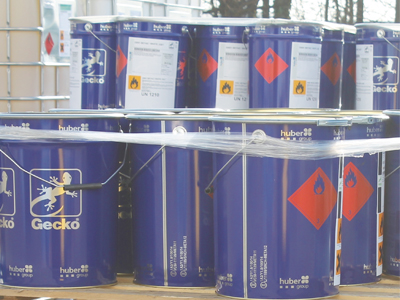
Capacity at Huber Italia is set to rise to 46,000 tonnes this year
Underlying the business philosophy is an ingrained belief in human capital investment, or ‘looking after your staff’. All employees are encouraged to undertake regular training and have access to an internal training programme which covers all aspects of ink technology, applications, ink specification, portfolio and print processes. ‘Most importantly,’ said Mr Dunmore, ‘people need to understand our company values and our concepts. In my experience, people are keen to learn, and even our finance officers want to know more about ink technology.’
As proven by a high staff retention rate, this is obviously a recipe that works. It is even more evident from the enthusiasm of the staff both in Italy and in the UK. As I walk through the Italian site, every person looks up with a big smile to say hello and happily answers questions. And it is access all areas, as Mr Dunmore proudly takes me through the impressive warehouses and manufacturing plants, where safety is top priority and plans are afoot to expand, improve and consolidate.
UK expansion
With the introduction of the Gecko range, hubergroup UK has been expanding with major investments in both production facilities and staff. Its Nottingham base now has a fully equipped technical support laboratory to ensure technical investigations can take place quickly and effectively. For colour management its X-rite spectrophotometry system has been networked to customers to ensure seamless colour data transfer, while the latest in laboratory proofing systems for flexo and gravure enable accurate reproduction of press conditions. This is backed up by a new Dromont ink dispenser.
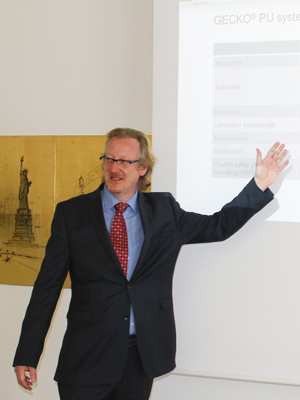
Paul Dunmore, European product manager
There has also been an extensive recruitment programme over the past 12 months with senior appointments in all areas with a particular focus on the technical side of the business. Managing director David Ward said that this process will continue in step with the planned growth. ‘All in all, we have invested over £500,000 to enable us to fully support Gecko inks in the UK market. All this is in place now.’
Mr Ward continued, ‘We have very decisive plans of what we want to achieve, and the aim is to approach customers where we can add value and bring in new ideas. There is a lot of energy and focus on coming up with new, more efficient ways of working, in order to bring the best result for our customers and to be competitive in this market.’
‘We have an exciting opportunity to play a major part in the industry,’ said Hal Halil, who is in charge of sales development of the Gecko range in the UK. ‘We may be a young company in terms of liquid inks, but we have a wealth of experience and a long history behind us. Our key selling point is the efficiency we can introduce into the customer’s operations, and we do this by working in partnership with them, not just selling them a bucket of ink.’

